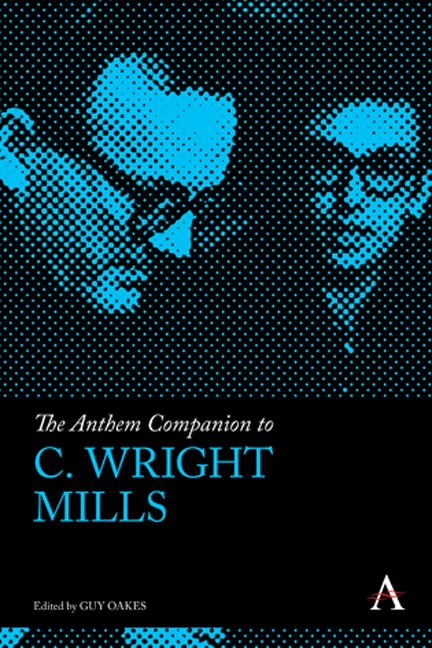Book contents
- Frontmatter
- Contents
- List of Tables
- Acknowledgments
- Introduction American Faust
- Chapter 1 C. Wright Mills on Law and Society: Hidden in Plain Sight?
- Chapter 2 Mills on the Economics of the Old Middle Class
- Chapter 3 Revisiting C. Wright Mills on the Militarization of Postwar American Society
- Chapter 4 A Critical Assessment of the Historical and Economic Underpinnings of C. Wright Mills's The Power Elite
- Chapter 5 Mills as Ethical Theorist: The Military Metaphysics and the Higher Immorality
- Chapter 6 C. Wright Mills and Latin America
- Chapter 7 For a Feminist Sociological Imagination: A Personal Retrospective on C. Wright Mills
- Chapter 8 The Sociological Imagination: A Reductionist Reading
- Chapter 9 Recent Changes in the Shape of Power
- Afterword. Mills as Classic?
- Contributors
- Index
Introduction American Faust
Published online by Cambridge University Press: 17 June 2017
- Frontmatter
- Contents
- List of Tables
- Acknowledgments
- Introduction American Faust
- Chapter 1 C. Wright Mills on Law and Society: Hidden in Plain Sight?
- Chapter 2 Mills on the Economics of the Old Middle Class
- Chapter 3 Revisiting C. Wright Mills on the Militarization of Postwar American Society
- Chapter 4 A Critical Assessment of the Historical and Economic Underpinnings of C. Wright Mills's The Power Elite
- Chapter 5 Mills as Ethical Theorist: The Military Metaphysics and the Higher Immorality
- Chapter 6 C. Wright Mills and Latin America
- Chapter 7 For a Feminist Sociological Imagination: A Personal Retrospective on C. Wright Mills
- Chapter 8 The Sociological Imagination: A Reductionist Reading
- Chapter 9 Recent Changes in the Shape of Power
- Afterword. Mills as Classic?
- Contributors
- Index
Summary
Whatever is the lot of humankind
I want to taste within my deepest self.
I want to seize the highest and the lowest,
To load its woe and bliss upon my breast,
And thus expand my single self titanically
And in the end go down with all the rest.
– J. W. Goethe, Faust, Part I, lines 1765–1775C. Wright Mills was born in Waco, Texas, on August 28, 1916. In the 1940s the governor of Texas observed that the frontiersmen who settled the wilderness that became Texas carried an ax, a rifle and a Bible (Powers 2015, 29). When Mills became an Ivy League professor and a New York intellectual, he was not averse to embellishing his Wild West provenance, solidifying his image of the intellectual who wrote by riding and shooting. Playing the part of the outlander, he kept his distance from the pretensions of the Claremont Avenue set and the cultural refinements of Morningside Heights in the neighborhood of Columbia University, where he taught in the undergraduate college. Mills seems to have believed that he forged in the smithy of his soul – if not the uncreated conscience of his race, then at least his own identity – creating himself ex nihilo. In fact, he received an excellent education at the University of Texas, especially in philosophy with George Gentry and David Miller. Both had doctorates from the University of Chicago, where they had studied with George Herbert Mead. Mills studied economics with Clarence Ayres, another Chicago doctorate in philosophy who taught institutional economics. Compared to contemporary graduate education in Anglophone sociology – where training in philosophy and economics ranges from primitive to nonexistent outside the subdisciplines of economic sociology and what is loosely called methodology – Mills's education was remarkably comprehensive and thorough. Yet he devoted much of his career to puncturing the mythologies, illusions and self-deceptions of his contemporaries.
Autobiographical fictionalizations aside, Mills was a protean and endlessly restless thinker.
- Type
- Chapter
- Information
- The Anthem Companion to C. Wright Mills , pp. 1 - 16Publisher: Anthem PressPrint publication year: 2016



